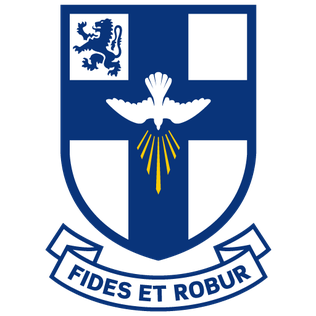
Fingal is a county in Ireland. It is in the province of Leinster and is part of the Eastern and Midland Region. It is one of three successor counties to County Dublin, which was disestablished for administrative purposes in 1994. Its name is derived from the medieval territory of Scandinavian foreigners that settled in the area. Fingal County Council is the local authority for the county. In 2022 the population of the county was 330,506, making it the second most populated council in Dublin and the third most populous county in the state.

Blackrock College is a voluntary day and boarding Catholic secondary school for boys aged 13–18, in Williamstown, Blackrock, County Dublin, Ireland. It was founded by French missionary Jules Leman in 1860 as a school and later became also a civil service training centre.

Gonzaga College SJ is a voluntary Catholic boys' secondary school in Ranelagh, Dublin, Ireland. Founded in 1950, Gonzaga College is under the trusteeship of the Society of Jesus, one of five Jesuit secondary schools in Ireland. The curriculum is traditional, with a broad general programme of subjects including Latin and Greek at Junior Cycle and eight subjects being studied in Senior Cycle for the Leaving Certificate.

Dunboyne is a town in County Meath, Ireland, 15 km (9 mi) north-west of Dublin city centre. It is a commuter town for Dublin. In the 20 years between the 1996 and 2016 censuses, the population of Dunboyne more than doubled from 3,080 to 7,272 inhabitants. As per the 2022 census, the population decreased slightly to 7,155. The town is in a townland and civil parish of the same name.
(Jenico) Nicholas Dudley Preston, 17th Viscount Gormanston, is an Anglo-Irish aristocrat and British hereditary peer, who sat in the House of Lords until 1999.

St Finian's College is a secondary school, the diocesan school of the Diocese of Meath. It is located in Mullingar, County Westmeath, Ireland, and is under the patronage of The Most Reverend Thomas Deenihan, Bishop of Meath. Rev. Dr. Paul Connell is its president. John McHale is the principal. Aisling Ryan and Emma Carey serve as deputy principals.

Gormanston railway station serves Gormanston, County Meath, Ireland. It is located between Balbriggan and Laytown, north of a cast-iron bridge on which the line crosses the River Delvin.
Ronald Bennett OFM was a Franciscan friar and a former spiritual director, sports master and bursar of Gormanston College, County Meath, Ireland, who was convicted of sexual assault against some of his pupils. His faculties for hearing confession and celebrating mass publicly have been withdrawn. Bennett lived at Dún Mhuire, Killiney, County Dublin.
St Paul's College in Raheny, Dublin, Ireland, is a Roman Catholic secondary school for boys under the trusteeship of the Vincentian Fathers, formally the Congregation of the Mission. Founded in 1950, it is one of two Vincentian schools for boys in Dublin.

Gormanston is a village in County Meath, Ireland. It is near the mouth of the River Delvin and the northern border of County Dublin.

Multyfarnham or Multyfarnam is a village in County Westmeath, Ireland. As of the 2022 census, it had a population of 460 people.

Gormanston Camp is a military camp in Ireland and consists of approximately 260 acres. It is used for air-ground and air-defence training. It is located between Balbriggan and Drogheda along the east coastline of Ireland in County Meath in close proximity to the M1 Motorway and Gormanston railway station.
Paul Walsh was an Irish priest and historian.

Wilson's Hospital School is a Church of Ireland, co-educational boarding school located in a protected Georgian building in Multyfarnham, County Westmeath, Ireland, outside of Mullingar. Founded in 1761, it is "Westmeath's oldest school". A private fee paying school for most of its history, in 2011 it transferred to the voluntary aided sector and does not charge fees for schooling but retains fees for boarding and extra curricular activities.
Fiachra Ó Ceallaigh, O.F.M. was an Irish Roman Catholic bishop. On 17 September 2009, he retired as an Auxiliary Bishop Emeritus of Dublin.
Tuileagna Ó Maol Chonaire was an Irish historian.

The Irish College of St Anthony, in Leuven, Belgium, known in Irish: Coláiste na nGael i Lobháin, Latin: Hibernorum Collegii S. Antonii de Padua Lovanii, French: Collège des Irlandais à Louvain and Dutch: Iers College Leuven, has been a centre of Irish learning on the European Continent since the early 17th century. The college was dedicated to St. Anthony of Padua.
Bishop Mathew Gaffney was a Roman Catholic Bishop of Meath.
College of the Immaculate Conception, Prague, was a Franciscan College, founded in 1629 by Irish Franciscan priests from Louvain. Instrumental in its foundation was its first Rector Patrick Fleming from Leuven, also involved was Fr Malachy Fallon, the Professor of Theology in Louvain, who persuaded the Holy Roman Emperor Ferdinand II to permit foundation of an Irish College in Prague. The establishment was seen as being part of a re-catholicisation of Bohemia, by the Habsburgs, but also to provide clergy for Ireland. Shortly after its foundation, Bohemia was invaded during the thirty-years war, Rector of the college Fleming and another Irish friar Mathew Hoare were captured and murdered by Calvinists.
John Evangelist McBride, O.F.M. was an Irish prelate of the Catholic Church who was bishop of the Apostolic Vicariate of Kokstad in South Africa from 1949 to 1951 and of the Diocese of Kokstad from 1951 to 1978. A member of the Franciscans, he was that order's provincial of Ireland before becoming a bishop.











